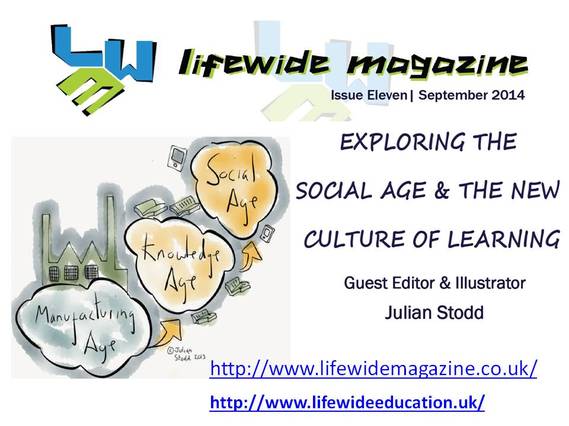
The notion of a Social Age of learning began to crystallise as we worked on issue 9 of the magazine, where our focus was a vision of learning for the 21st century and beyond - a vision of informal, personalised but collaborative learning. The vision is both formed and realised by technologies which are changing our access to information and the ways in which we create new meaning. The hierarchical model of omniscient teacher passing down their unquestioned knowledge crumbles as social media encourage exploration, exchange, reuse and co-creation of ideas.
As we developed this theme in issue 10 of the magazine, we began using the term ‘Social Age of Learning’ after coming across Julian Stodd's ideas in his popular blog http://julianstodd.wordpress.com/. It was a natural step for us to invite him to guest edit Issue 11 and what an amazing job he has done! in providing us, through his articles, a framework around which other writers and the editors can elaborate.
While we were assembling this issue, the members of the editorial team, excerpt for Julian of course! were conscious that we were of the generation that has spanned the transition from an Industrial Age of design and production to an Information Age in which knowledge resources and expertise are as crucial to success as other economic resources. But we tend to overlook the fact that growing out of the Information Age is something different is a new 'Social Age' of learning aided by the internet and its associated technologies and our changing means and habits of communicating and participating in the on-line worlds we increasingly inhabit. Fundamentally, as a society we are changing the way we find, share and co-create information to develop new knowledge and meaning, achieve our individual and collective goals and purposes and create or co-create things we value.
The changes that are defining the Social Age have profound implications for the way we learn and develop through our institutions for education - our schools, academies, colleges and universities. Our educational system is founded on approaches to learning and teaching that were originally developed for an industrial age. They were partially adapted to the knowledge age but have yet to be reconceived for the Social Age. This issue draws attention to some educational experiments that point us in the direction that our formal systems of education need to go if we are to embrace the self-organised interest-driven forms of informal collaborative learning that characterise the Social Age.
Lifewide Magazine is a good example of how we discover develop, curate, re-purpose and re-contextualise and share knowledge in the Social Age. Its content is intended for a particular community - people who are interested in the educational implications of the ideas we explore. Its purpose is to enable us to develop the narrative that ultimately we hope will inspire and help the members of our community and anyone else who discovers our stories. Its production is always a collaborative, co-creative venture driven by values, interest and curiosity, and created through inquiry facilitated by the enormous information resources we can access through the internet and the technological tools now available. Similarly, the way we share and distribute the knowledge it contains is largely achieved through the internet and social media. None of this would have been possible even a decade ago which shows how quickly this new era is shaping our thinking and practices. Our Magazine is a perfect example of learning in and for the Social Age.
The Social Age seems a natural home for our ideas and practices relating to lifewide learning, education and personal development. Looking back over previous issues of the Magazine we can see how we have journeyed towards this moment of recognition and appreciation. We hope that you will read the Magazine and share your perspectives on this social phenomenon.
http://www.lifewidemagazine.co.uk/
 RSS Feed
RSS Feed
